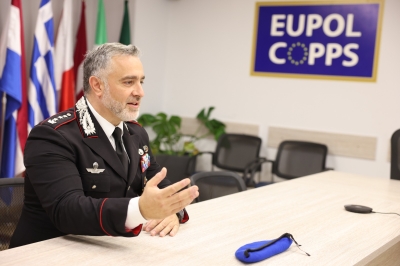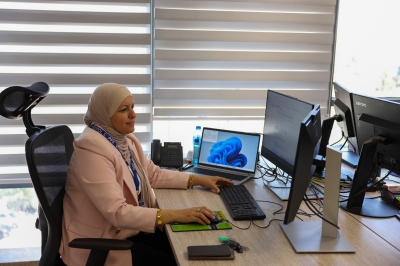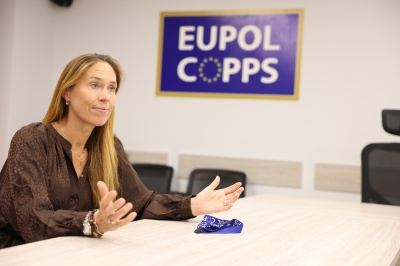Spotlight on our Translators

Since the inception of EUPOL COPPS in January 2006, interaction between the Mission’s Palestinian counterparts and international advisors who speak different languages and come from different cultures has been a fundamental part of the Mission’s work and a natural consequence of face-to-face communication. In its broad sense, the purpose of interpretation and translation is to facilitate communication, create bridges and aid others to cross linguistic and cultural boundaries. Undoubtedly, communication is central to the work of a translator. Inasmuch as without translators there can be no facilitation of communication, translators are not only a backbone of the Mission, but indispensable to its success.
EUPOL COPPS employs a pool of eight qualified and experienced translators that do verbal interpreting, non-verbal translation and cultural communication in a multicultural milieu. Verbal interpreting is generally performed in two modes: consecutive and simultaneous. Consecutive interpreting usually takes place in formal meetings during which interpreters render what is said in the target language, English or Arabic. Simultaneous interpreting is performed in real time during workshops and conferences involving large audiences. Occasionally, Mission translators use background interpreting or chuchotage, which is one-to-one direct interpreting where the interpreter whispers the translation to a very small audience.
In the context of the work of the Mission, non-verbal or written translation may include the translation of various texts such as police related documents, legal papers, laws, press releases, action plans, manuals and guidelines. The high level of concentration, accuracy and prompt response underpinning both verbal and non-verbal translation as well as the mental activities involved in the comprehension, deverbalisation and reformulation processes bring to the fore the challenges faces by our translators on a daily basis.
In addition to the important role of translators as converters of messages from one language to another, they are of paramount importance to cross-cultural communication. As cultural mediators, EUPOL COPPS translators have both the linguistic and cultural competences to facilitate communication between international advisors and their local Palestinian interlocutors. Their familiarity with the cultures of the source and target languages is instrumental in bridging the cultural gap between international experts and their local counterparts.
Lack of knowledge and understanding of other cultures may cause confusion, misunderstanding and sometimes offense during communication, hence missions prudently employ local translators to avoid or minimise potential for misunderstanding. Understanding the customs, manners and social traditions of communities where missions operate will enhance and optimise their work. In the case of EUPOL COPPS, such understanding indicates the respect of international mission members for the Palestinian community and their integration into the reality of Palestine. Indeed the interest of international mission members to learn the local language, Arabic, demonstrates their interest in the Palestinian community and its culture, and reflects cultural sensitivity and good breeding.
Nonetheless, the cultural role of translators is not limited to bringing mainstream social cultures closer. Mission translators render effective communication in two other cultural domains, namely the police and the rule of law subcultures. Both policing and law are socio-cultural phenomena linked to the larger mainstream culture of the Palestinian community. Given the seriousness of the work of the police and the justice system, the translators of the Mission undertake assignments knowing full well that if the act of translating or interpreting is not carried out to a satisfactory and professional standard it could have grave and far-reaching consequences.
Translation/interpretation is a communicative activity that signifies interchange between cultures. Such interchange takes place through the medium of language and it requires a human agency – or a translator. In the words of the British novelist Anthony Burgess, “Translation is not a matter of words only; it is a matter of making intelligible a whole culture.”
Press and Public Information Office Comment: The entire Mission is very grateful to have such a dedicated and professional team of translators on board. Your work is an essential part of the EUPOL COPPS engine, and I speak on behalf of all Mission Members in expressing our sincere thanks to you all for making our constant interactions with our local counterparts possible! Thank you!
Follow us on Social Media











